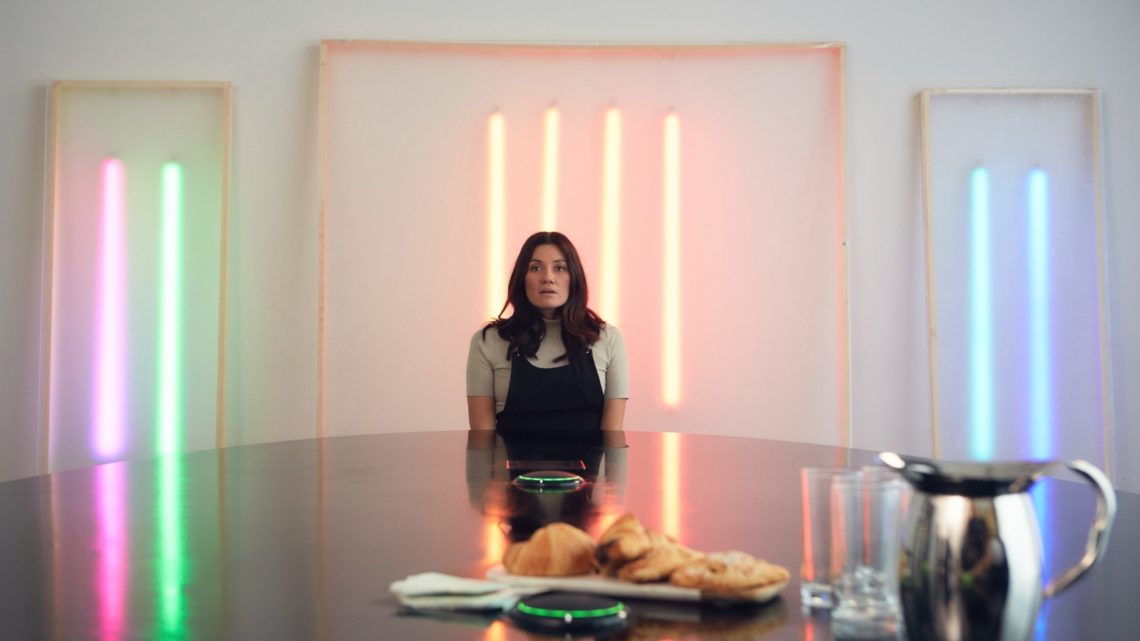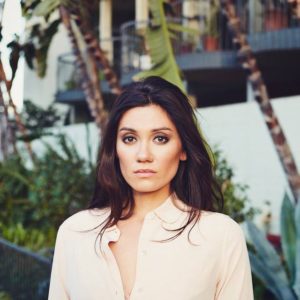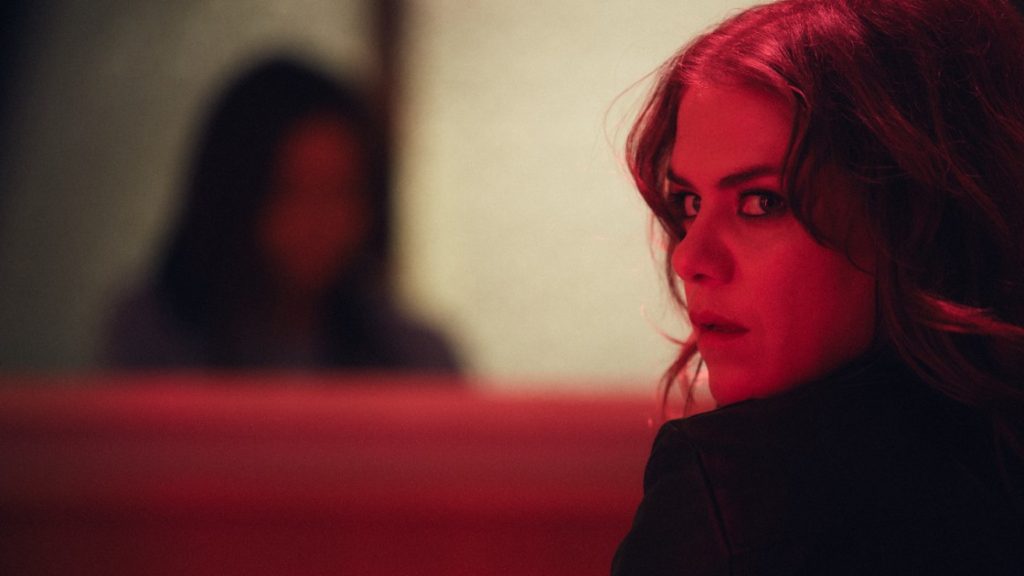
Ghost BFF Interview: Vanessa Matsui
“Female voices have been ignored for so long. Only seeing and presenting one gender’s perspective is not only boring but also dangerous.”
Exploring issues of anxiety, motherhood, abortion and grief, the series GHOST BFF should be a dark drama but clever writing and great performances give the show a lightness that allows the viewer room to breathe.
Picking up the pieces of Season One, GHOST BFF returns with Tara unable to cross over, and Amy dealing with an unexpected pregnancy. Creator and star Vanessa Matsui anchors the show, using her personal experiences to explore these issues in a neutral way.
Discovering the boundaries of the afterlife in this show are interesting, but can lead to a common problem with the science fiction genre. The issue of consent is skipped over, as Tara forces herself into other people to get what she needs while they wake up with no memory of what their bodies have done.
That aside, this plot device does allow for closure. It forces open old wounds and gives resolution and clarity to problems buried deep.
GHOST BFF stars Kaniehtiio Horn (Barskins, Letterkenny), Angela Asher (Bad Blood), Jean Yoon (Kim’s Convenience) and Dan Beirne (Workin’ Moms, Murdoch Mysteries), and both seasons are available to stream.
To learn more about GHOST BFF and watch the series, CLICK HERE.
Tell us a little bit about yourself, and how you got involved with filmmaking.
 Vanessa Matsui: I’m a half-Japanese, half-Canadian actress-writer-director who grew up in Toronto. I’m also a mom. I first got involved with filmmaking in my early 20’s after being a hired actor for WIDC in Banff. I was so inspired by the female director-writers that I met there that I decided to make my first short film. It went on to screen at the Vancouver Asian Film Festival and I caught the creator bug.
Vanessa Matsui: I’m a half-Japanese, half-Canadian actress-writer-director who grew up in Toronto. I’m also a mom. I first got involved with filmmaking in my early 20’s after being a hired actor for WIDC in Banff. I was so inspired by the female director-writers that I met there that I decided to make my first short film. It went on to screen at the Vancouver Asian Film Festival and I caught the creator bug.
Tell us about Ghost BFF, and where the idea came from.
VM: Ghost BFF is a dark comedy about two best friends, Amy and Tara. Tara, the ghost, died by suicide and comes back to earth to confront her best friend on some recent life choices but also to find closure on earth. The idea came about after I lost a friend to suicide and had another friend who was suicidal.
What is it like crafting this complex but caring relationship between these two friends, especially as one has died?
VM: It was hard! There were many many drafts, many note cards that got ripped up. Many journals, cut scenes. In a way though, having the boundary of one friend being dead was liberating because you knew the limit. I had somewhere to create from and it opened up the show to a kind of sci-fi place instead of it just being a buddy comedy. Not that there’s anything wrong with a buddy comedy. But the ghost adds a dimension to play with. The ghost is the truth sayer. She can say and do the things that Amy can’t let herself say or do.
The second series deals with pregnancy, motherhood and abortion as a complicated choice with no judgement. What was it like crafting this storyline?
VM: In between Season 1 and 2 I became a mother, so the pregnancy and motherhood storyline came very naturally to me as it was all I was thinking about. This new dimension of existence just opened up in my life and I was very curious about exploring it and this new understanding of motherhood and the enormous respect I gained for mothers and my mother!
The abortion was Brent Skagford’s idea. He helped brake the season with me and we were looking at the board one day, and he said, ‘y’know, I think Amy needs to have an abortion’ (originally I thought she was going to have a baby). And once he said it, I knew it was right for the character and for the show.
Also, all that push back on women’s rights was happening in the States at the time and it felt important to normalize this experience that so many women go through. I’m very proud of the abortion scene. Our director Lindsay MacKay did such a great job capturing it. It is the one scene in the entire show (S1 & S2) that wasn’t handheld and I felt that it added so much to it.
This season of Ghost BFF has PSAs that come with each episode. What inspired you to create these and did you work with anyone to help craft a safe message for those viewing?
VM: The PSA’s this season were crafted by my producers Katie Nolan and Lindsay Tapscott with support from the Centre For Mindfulness Studies. The original inspiration for them was that I knew I didn’t want to just make this show about suicide and leave it there. Katie and I were brainstorming during the early stages of development and we thought that there should be resources on the website, and then our Exec Producer for S1 Ana Serrano suggested we speak with her mom Tita who worked at the Centre For Mindfulness Studies. After meeting her we knew that an exploration of Mindfulness was the perfect fit for our audience as it is cost-effective and evidence-based and they came on board to help develop the PSA’s.

Can you speak about what it is like being a woman of colour in the Canadian film/television industry?
VM: Honestly, sometimes it is hard. But this is a hard industry no matter who you are. I think at times my own internalized racism gets in my way—like, my agent will send me an audition and it’s for the lead, and my first thought is, “oh I’m never going to get this because I’m not white.” It’s horrible and not necessarily true.
However, I’ve been a professional actress for over 15 years and I have only been in 3 projects that either the 1 or 2 positions have been people of colour. And that includes my show. But, I have noticed a massive shift in my short-ish time in the industry, I’m excited and inspired that white people seem to be waking up to the realities of racism. While grassroots movements are essential and important, nothing really changes unless there are changes from the top. And we need to go beyond tokenism.
I love the mother-daughter relationships in the series, especially Amy and her supportive mother, can you speak about why you decided to juxtapose these relationships and why you wrote them in the show.
VM: I mean, Amy’s mom is basically my mom and dad. They are crazy supportive, to almost a ridiculous degree. Like, if no one watched Ghost BFF they would be the ones who watched a hundred times singing my praises.
Also, having become a mom, the love I have for my daughter is un-real. Of course, I would support her shitty art show no MATTER WHAT, ha! Not that Amy’s show is shitty but you get it. Attendance wise, it was disappointing for Amy. I love Amy’s art. It is all made by Laura Dawe who I am obsessed with.
Writing Tara’s mom Coco was more challenging. Finding her voice took time for me. I have friends with dysfunctional relationships with their mothers and that is where she came from. I basically stole from around me.
Can you tell us about some/all of the other amazing womxn/non-binary people who worked on this film?
VM: So many! My incredible producer Katie Nolan, who was the first champion of this project and the first person to join me, and her partner Lindsay Tapscott of Babe Nation.
My intelligent, creative and thoughtful director Lindsay MacKay. Hanna Puley my Art Director who made all my dreams come true and who is responsible for the Bros playing that VR game in their office.
Jess Sanchez my fabulous costume designer who did such a GLOW UP for S2. Andi Clifford who made my face and hair look like that! Rachel Arundal our first AD, Shawna Edwards our scripty, Amanda Wong my 2nd and Rachel my driver who calmed me down every morning after leaving my screaming daughter.
Laura McMillan (my editor) and Kathleen Munroe whose music was featured in both seasons. Jen and Cleo at Sundance who read so many drafts, Clara Altimas, Daisy Long, Sandi, Lindsay and Chen who all provided valuable notes and support throughout my process. And many more!
Tell us about why you are a feminist and why it’s important to your filmmaking.
VM: I think this world would be in a lot less trouble if there was equality if there was diversity at the table, and if everyone got to enjoy clean water, safety, and shelter—not just a few.
It’s important to my filmmaking because female voices have been ignored for so long. Only seeing and presenting one gender’s perspective is not only boring but also dangerous.
What are you working on now/next?
VM: I’m writing two new pilots for TV (one that is inspired by my Great grandmother’s journey from Hiroshima to Canada and one about the female mid-life crisis) and I’m also in a new show on Netflix called Grand Army which should be coming out soon and continuing my role on Letterkenny.
Finally, recommend one #MUFFApproved film for our blog readers.
VM: I’m such a TV fan so my pick is A BLACK LADY SKETCH SHOW. It is unreal how funny it is. I love it with my heart and soul and have watched some of the sketches dozens of times.
Keep up to date with Ghost BFF: Twitter | Instagram.
*This post was originally featured on The MUFF Society.*

